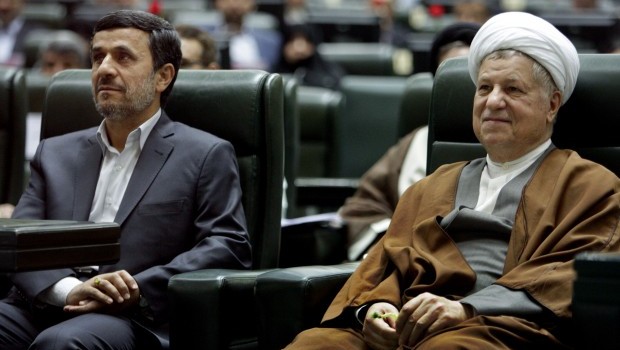
In this Sunday, May 27, 2012, file photo, former Iranian president Akbar Hashemi Rafsanjani, right, smiles as he sits next to President Mahmoud Ahmadinejad at an inauguration ceremony of the parliament in Tehran, Iran. (AP Photo/Vahid Salemi, File)
On a trip to the city of Urumiyeh, the capital of Iran’s northwestern province of West Azerbaijan, Ahmadinejad said that the reform program was a success, but had been undermined by international sanctions and “subversion” in the currency market, according to the official news agency IRNA.
“Total implementation of subsidy reform would lead to elimination of poverty in the country—meaning no poor [people] any longer,” he added.
Ahmadinejad also ridiculed critics of his economic program, lambasting their previous predictions that his policies would lead to sharp increases inflation, with dire socio-economic consequences.
Subsidy reform was first introduced by the government of Hashemi Rafsanjani in the early 1990s, but quickly halted by hardline conservatives loyal to Iran’s supreme leader, Ayatollah Khamenei.
Iran’s economy has for many decades been heavily dependent on oil revenues to subside energy consumption and consumer goods. Lack of a proper taxation system and a transparent banking industry has resulted in heavy state subsidies and a major role for the government in managing the market.
Since Ahmadinejad launched his subsidy reforms in 2010, prices have doubled or tripled in some cases, accompanied by skyrocketing rates of inflation and unemployment. Although Ahmadinejad’s critics, like MP Ahmad Tavakolli, accept the need for subsidy reform, they question his team’s ability to implement such huge and crucial reform program effectively.
From this speech and many others during the last 6 months, it has become more and more obvious that Ahmadinejad attributes Iran’s economic problems to sanctions and what he describes as “a powerful political and economic mafia,” both of which are beyond his reach.
While nuclear and foreign policy are explicitly under Ayatollah Khamenei’s control, Ahmadinejad and other potential presidential candidates only find themselves free to maneuver on economic policies, although that too has been subjected to crippling sanctions because of Iran’s unbending nuclear policy.
In parallel to Iran’s political deadlock, Hashemi Rafsanjani has again responded vaguely to supporters pressing him to run for president.
In a meeting with a group of Tehran University students on Sunday, he indicated that he would not stand for election without the approval of Ayatollah Khamenei, saying that a confrontation between the backers of the two men would be highly damaging to both.
However, Rafsanjani also offered guarded criticism of the current state of Iranian politics, comparing the suppression of Iran’s youth in the pre-revolutionary era with that of the present day.
He nonetheless reassured his audience that today’s Iran possessed far more “intelligent and determined young population” than it had when he was a revolutionary.
The deadline for registration of presidential candidates in Iran’s forthcoming election is May 11, when the complete list of applicants will be known. Iran’s Guardian Council will then vet the list and release a list of approved candidates.
